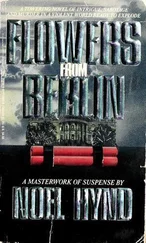Simon Tolkien - Orders from Berlin
Здесь есть возможность читать онлайн «Simon Tolkien - Orders from Berlin» — ознакомительный отрывок электронной книги совершенно бесплатно, а после прочтения отрывка купить полную версию. В некоторых случаях можно слушать аудио, скачать через торрент в формате fb2 и присутствует краткое содержание. Жанр: Полицейский детектив, на английском языке. Описание произведения, (предисловие) а так же отзывы посетителей доступны на портале библиотеки ЛибКат.
- Название:Orders from Berlin
- Автор:
- Жанр:
- Год:неизвестен
- ISBN:нет данных
- Рейтинг книги:4 / 5. Голосов: 1
-
Избранное:Добавить в избранное
- Отзывы:
-
Ваша оценка:
- 80
- 1
- 2
- 3
- 4
- 5
Orders from Berlin: краткое содержание, описание и аннотация
Предлагаем к чтению аннотацию, описание, краткое содержание или предисловие (зависит от того, что написал сам автор книги «Orders from Berlin»). Если вы не нашли необходимую информацию о книге — напишите в комментариях, мы постараемся отыскать её.
Orders from Berlin — читать онлайн ознакомительный отрывок
Ниже представлен текст книги, разбитый по страницам. Система сохранения места последней прочитанной страницы, позволяет с удобством читать онлайн бесплатно книгу «Orders from Berlin», без необходимости каждый раз заново искать на чём Вы остановились. Поставьте закладку, и сможете в любой момент перейти на страницу, на которой закончили чтение.
Интервал:
Закладка:
Bertram was writhing more than squirming now, and he kept putting his hand up to his neck, pinching the skin around his Adam’s apple. It was as if he were unconsciously seeking the bow tie that Twining had removed from him during the strip search and had not given back. Or maybe he was thinking about the noose, Trave thought with sudden understanding.
‘I need some time — time to think,’ he said eventually.
‘Certainly,’ said Quaid. ‘A very reasonable request. You can have as long as you need.’ Turning, he pressed a buzzer on the wall, and within moments Constable Twining appeared in the doorway.
‘Take Dr Brive to his cell,’ Quaid ordered. ‘And give him a cup of tea and a ham sandwich. He looks like he needs it.’
Quaid seemed in no hurry to resume. He read his newspaper from cover to cover and then methodically worked his way through a pile of official papers on his desk until Twining reappeared. An hour and a half had gone by — Trave had timed it on the clock.
‘The prisoner is asking for you, sir,’ Twining said deferentially. ‘Says he wants to talk.’
‘All right, bring him back,’ said Quaid with a sigh. ‘Let’s see if he’s willing to listen to reason.’
Bertram looked as nervous as before when he came into the interview room, but he seemed determined too, as though he’d come to a decision and was resolved to go through with it.
‘You’ll put what you told me in writing, will you?’ he asked Quaid. ‘So you can’t go back on it?’
‘Certainly,’ said Quaid. ‘I’ll sign my undertaking at the same time as you sign your confession. Detective Trave here can witness our signatures. Will that work for you?’
Bertram nodded. He looked like a beaten man. ‘I don’t want to see my wife if she comes here looking for me,’ he said. ‘I can’t face her, not any more.’
BERLIN
Heydrich dismissed the Lisbon courier with a cursory salute and slit open the package with a silver paper knife adorned with an eagle and swastika — a present from his wife on the occasion of his last birthday. The report was in English but he could read the language fluently. He grimaced at one point, but then nodded twice at the end as if satisfied with its contents and picked up the telephone. He was in luck. The Fuhrer was in Berlin and would see him that afternoon.
Heydrich sat back in his chair and closed his eyes, allowing his mind to travel back six years to when he’d first met Charles Seaforth on a warm September day just like this one, with the sun shining down on Berlin. It was a good time, full of promise. Hitler had succeeded to the chancellorship a year earlier, and the transformation of the country was already under way. The currency was stabilized, rearmament had begun, and you could sense the country’s new-found sense of purpose wherever you went. Heydrich’s star was on the rise, following that of his master. Three months earlier, Ernst Rohm and Heydrich’s other rivals in the Nazi party’s paramilitary wing, the SA, had been dispatched on the Night of the Long Knives, and his power base in the Gestapo and the SS was now unchallenged. Years of consolidation lay ahead as the party took control of every facet of life in the new Reich, but the way ahead was clear.
Seaforth had come to Germany ostensibly on a covert operation to recruit agents for the British Secret Service, but his real purpose had been to seek out Heydrich and enlist in the service of the Fuhrer. Heydrich had never encountered an enemy agent who displayed such a single-minded eagerness to betray the country of his birth. He had wanted money, but not an excessive amount, and Heydrich had sensed from the outset that the motive of financial gain was entirely secondary to his new recruit’s passionate, overarching desire to hurt England. This was what mattered to him — he appeared to have no great intrinsic interest in or enthusiasm for National Socialism and the new order in Germany. The resurgence of German power was important to him because he believed that it would lead to war. His certainty on this point had surprised Heydrich. War with England had seemed far from inevitable back in 1934, with a sympathetic government at the helm in London and the Fuhrer moving cautiously step by step to consolidate his power. But Seaforth had been proved right, and his accurate prediction of the future had increased Heydrich’s respect for his new agent.
Seaforth’s hatred for his country was the reverse of everything that Heydrich stood for. Heydrich prided himself on his patriotism, but here he was, placing his trust in a man who wanted to commit high treason. Why? Partly, of course, because Seaforth’s story made sense. Heydrich had verified the details, and Seaforth certainly had no reason to love England after all that had happened to him. But Heydrich also instinctively recognized that the wellspring of anger that drove each of them forward was essentially the same, even if it led them in opposite directions. Heydrich had been enraged by the November criminals who had signed away the fatherland in 1918, just as Seaforth abhorred the British generals and politicians who had sent their people to die in droves year after year in the mud of Flanders and northern France. Only their conclusions separated them: Heydrich wanted to change his country, whereas Seaforth wanted to destroy his.
But it was more than rage that they had in common — they shared a capacity to channel and direct their anger. Both were prepared to be extraordinarily patient in the pursuit of their goals; they did not take unnecessary risks but instead built slowly and carefully towards a position of power. For Heydrich, the policy had already paid dividends — he had complete power over the lives of everyone in the Reich through his control of the SD and the Gestapo. Seaforth’s rise had been slower, but the war had helped his cause with the concentration of MI6’s focus away from Soviet Russia and onto Germany, where his fictitious network of agents was located. With Seaforth’s help, Heydrich had been able to liquidate all the other high-level British agents operating inside Germany. He’d done it gradually, picking them off here and there so as not to give the game away either to Seaforth’s superiors in MI6 or to his own rivals in the Abwehr, the official Reich intelligence service run by Heydrich’s rival, the wily Admiral Canaris. But now, finally, Seaforth was the only MI6 spymaster receiving high-level intelligence from inside the Reich, and he was climbing the ladder of seniority inside the British Secret Service at a rate that would have been inconceivable two years earlier. One day soon he might become deputy chief, and MI6 would become an unwitting branch of the Gestapo.
Yet now, out of the blue, after all the years of painstaking groundwork, Heydrich’s prize agent was proposing to risk everything on one throw of the dice. The assassination plan was a good one, and Seaforth had the capacity to carry it out — Heydrich had no doubt on either of these scores. The scheme could certainly succeed, but it was opportunistic in nature and depended on a fair slice of luck. Heydrich wondered why Seaforth wanted to expose himself in this way, but then he turned the interrogation light onto himself and was even more surprised at his willingness to agree to the idea. There was the political answer, of course. Churchill’s removal could make all the difference, and Heydrich would gain immeasurably if he received the credit for knocking England out of the war. But it was more than that. The recklessness of the plan and the boldness of the stroke appealed to Heydrich at a gut level. It felt like flying into combat again, wheeling his Messerschmitt fighter through the sky towards the enemy aircraft. Leaning back in his chair with a faraway look in his eye, he felt a deep sense of kinship with this Englishman whom he hadn’t seen in over a year and might well never see again. Charles Seaforth was a man after his own heart.
Читать дальшеИнтервал:
Закладка:
Похожие книги на «Orders from Berlin»
Представляем Вашему вниманию похожие книги на «Orders from Berlin» списком для выбора. Мы отобрали схожую по названию и смыслу литературу в надежде предоставить читателям больше вариантов отыскать новые, интересные, ещё непрочитанные произведения.
Обсуждение, отзывы о книге «Orders from Berlin» и просто собственные мнения читателей. Оставьте ваши комментарии, напишите, что Вы думаете о произведении, его смысле или главных героях. Укажите что конкретно понравилось, а что нет, и почему Вы так считаете.












